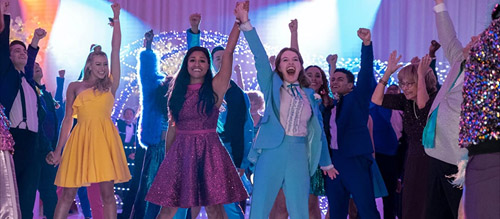The Prom (2020) Review
The Prom (2020)
Director: Ryan Murphy
Screenwriters: Bob Martin, Chad Beguelin
Starring: Meryl Streep, James Corden, Nicole Kidman, Andrew Rannells, Jo Ellen Pellman, Ariana DeBose
With the popularity of productions such as La La Land and The Greatest Showman, as well as smaller films like Anna and the Apocalypse and Sing Street, the movie musical has seen something of a resurgence over the past five years or so. Looking to take advantage of the genre’s popularity, Netflix have adapted the critically acclaimed Broadway musical “The Prom”, with the creator of ‘Glee’, Ryan Murphy, and two of the original writers, Bob Martin and Chad Beguelin, each on board to head what the streaming service are hoping is its next big hit. With an incredibly talented mix of musical actors (both on stage and on screen), and the talent of those working on the film behind the scenes, Netflix’s The Prom promised a great modern musical but ultimately offers something far less enthusing, the film failing to excel in ways that cover up its deficits.
The Prom follows four Broadway actors – Dee Dee Allen (Meryl Streep), Barry Glickman (James Corden), Angie Dickinson (Nicole Kidman) and Trent Oliver (Andrew Rannells) – who travel to the conservative town of Edgewater, Indiana, to help Emma Nolan (Jo Ellen Pellman), a student banned from taking her girlfriend Alyssa Greene (Ariana Debose) to her high school prom.
A running pitfall of The Prom is in its exploitation of stereotypes. The film makes a point to portray stereotypes both through their inaccuracies and their truths. Well… it certainly tries to anyway. Presenting small town America as the most ignorant type of conservative breeding grounds whilst also portraying Corden’s character Barry through the “show queen” stereotype of Gay men, The Prom more often than not avoids the commentary necessary for such stereotyping to hold a message or any value to the overall plot (or our overall enjoyment).
Although Corden’s “show queen” personality is very much at the forefront of Barry’s character, he is the one who undergoes the most enjoyable evolution and arguably becomes the very best part of the film. Corden delivers a surprisingly charismatic performance and shines in a number of scenes, releasing himself from the shackles of his reputation as a divisive figure to offer a pleasant surprise at the head of this film.
Among the other key castmates is Meryl Streep, who offers a good and watchable but hardly unmissable performance as Dee Dee, while the film’s other major drawing point Nicole Kidman is slotted into a role in which her talents are stifled. When it comes to Kidman’s character and that of Andrew Rannells’ Trent, there seems to be little reason as to why either need to be in the movie, with both failing to add to the story bar two horrible musical numbers (“The Acceptance Song” and “Zazz”). Ellen Pellman and Ariana DeBose simply do not get the screen time needed to leave much of an impression.
The blame regarding this and The Prom’s wider failures must fall on the shoulders of the screenwriters. Although both men wrote the original musical, their lack of experience writing feature length films is clear here, with a large majority of the film’s issues coming from the script itself. With exposition riddled dialogue (Dee Dee Allen’s character intro literally comes from a reporter saying “Dee Dee, you’re a broadway star!” to which she responds “yes I am!”), one dimensional characters and terrible shifts in tone, The Prom is not short of screenwriting sins, but perhaps its biggest is that Emma (Pellman) – the character around whom the entire story revolves – is nothing more than a side character, The Prom cheating prospective fans out of a genuine emotional arc. Instead, we are forced to follow four self-obsessed broadway stars whose emotional character progressions are either non-existent or practically plucked out of thin air.
Although the majority of the film’s issues come from the screenplay, Ryan Murphy’s direction only works to magnify them. His terrible direction of the actors – his only direction towards Pellman seeming to be “Smile!” – doubled with Martin and Beguelin’s terrible writing creates a deadly mix that, if it hadn’t been for the popular cast people will undoubtedly be excited to see, could have sunk the entire film.
That isn’t to say that the trio deserve no praise whatsoever, as The Prom does actually present a fun, energetic and infectious atmosphere, something the stage play developed a reputation for. The scale and spectacle of the song and dance routines is nothing short of impressive, while most of the soundtrack is simply wonderful, and likely to stick in your head for weeks. The production and costume design play vital roles in furthering these achievements, solidifying The Prom as a beautiful film to look at. There is no doubt that the work in this regard will enter this latest high budget Netflix offering into the conversation regarding awards recognition, and may make it a frontrunner in the production design and costume design categories at the 2021 Oscars.
In these ways, The Prom excels, but no matter how deep you dig, how far you search or how objectively you do or do not look at it, this fun, fast-paced, large in scale musical with a number of notable performances is ultimately far from a critical darling, and will likely be more The Greatest Showman than La La Land, landing in the realm of audience favourite instead of Best Picture contender. It is simply too difficult to be swept away, and immersion is the key to the success of all movie musicals.
12/24


